Serra Mallol, C., 2018, Monetary income, public funds, and subsistence consumption: the three components of the food supply in French Polynesia — a comparative study of Tahiti and Rapa Iti islands, Review of Agricultural, Food and Environmental Studies, Volume 99, Issue 1, pp 37–55

Serra Mallol, C. Review of Agricultural, Food and Environmental Studies (2018) 99: 37. https://doi.org/10.1007/s41130-017-0057-2
Abstract:
The question of the impact of food supply on food practices rises in a particular sociocultural environment—French Polynesia, an overseas territory—forged by a political and economic post-colonial system inferring a triple modality of food resources: monetary incomes, public funds, and subsistence consumption. The comparison between two Polynesian islands, Tahiti mostly central and urban and Rapa mostly peripheric and rural, highlights the variability of intracommunity food exchanges and symbolized social meanings. Rapa’s choice of food resources collective control is readable through the importance of gifts, exchanges, and pooling food flows. The dimension of subsistence consumption, re-embedded in specific social temporality, allows local implementation of an integrated model of resource management.
Keywords: French Polynesia Sociology of food Socio-techno-cultural system Oceania
Full text (on line or .pdf) – Link Springer.com
Christophe Serra Mallol est maître de conférences en sociologie à l’Université Toulouse – Jean Jaurès (ISHTIA) et membre du CERTOP.
Ses travaux de recherche recouvrent la sociologie et l’anthropologie de l’alimentation des territoires ultramarins (Polynésie française, Nouvelle Calédonie), la question des inégalités sociales et de l’exclusion (obésité, sans-abrisme, prostitution de rue), et les aspects sociaux de la qualité de vie et des temporalités.
En savoir plus
Contact : christophe.serra-mallol@univ-tlse2.fr
© INRA and Springer-Verlag France SAS, part of Springer Nature 2017






